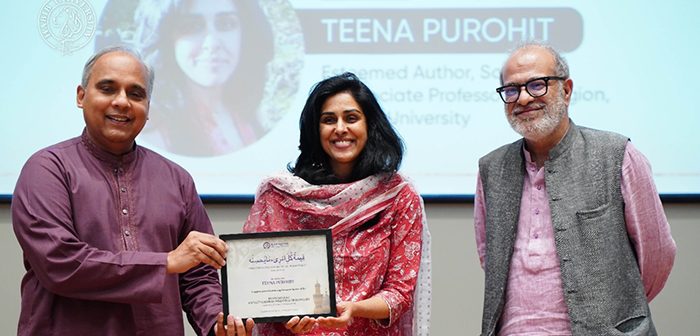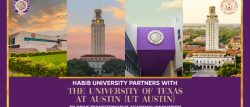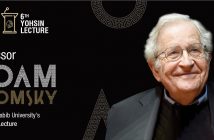Habib University hosted the second lecture of the Imam Ali (A.S.) Lecture Series, marking a profound exploration of the charismatic paradigm in Islamic thought. The event, moderated by Basharat Issa, Lecturer in Comparative Humanities at Habib University, featured an insightful presentation by Dr. Teena Purohit, Associate Professor of Religion at Boston University.
Dr. Purohit, in her first-ever visit to Karachi, shared her heartfelt appreciation for the hospitality she received. “Without any family connections or historical ties to this region, I wasn’t sure what to anticipate. However, the warmth and generosity I’ve experienced, especially through Habib University, have been heartwarming and deeply enriching,” she remarked. Her sentiments reflect a recurring theme among global scholars visiting Habib University, where the institution’s dedication to fostering inclusive academic dialogue resonates across cultural and geographical boundaries. This ethos has positioned Habib as a hub for intellectual engagement with leading personalities from diverse fields worldwide.
Exploring the Charismatic Paradigm
The lecture, titled “Imam Ali (A.S.) and the Charismatic Paradigm in Modernist Muslim Thought,” delved into the intersections of leadership, religiosity, and modernism. Dr. Purohit shared insights from her latest research project, which investigates the legacy of Imam Ali (A.S.) and how it transcends sectarian and religious boundaries.
“In Islamic history, leadership has oscillated between two models of authority,” she explained. “The first is charismatic authority, epitomized by Prophet Muhammad (P.B.U.H.) and carried forward, according to Shia traditions, through Imam Ali (A.S.) and his descendants. The second is exemplary authority, rooted in the Prophet’s conduct, or Sunnah, which modernist Sunni reformers often emphasized.” Using the theoretical frameworks of Max Weber, Dr. Purohit examined how charismatic leaders evoke profound emotional responses, contrasting this with the modernist critique of such figures as fostering backwardness or irrationality.
Imam Ali (A.S.) as a Bridge Across Traditions

Dr. Purohit’s research highlights how Imam Ali’s (A.S.) charisma resonates not only within Islamic traditions but also beyond them, engaging non-Muslim faiths such as Hinduism and Sikhism. “In Shia Islam, the Imam embodies divine light, serving as a conduit for followers to connect with the divine. This concept finds striking parallels in Sikhism, where the guru is similarly regarded as a divine guide,” she noted. Referencing Guru Nanak’s Gurbani, she explained, “The equivalence between Govind (the Supreme Lord) and the guru mirrors the way Imam Ali (A.S.) is perceived in Shia thought.” This porous religiosity, Dr. Purohit argued, challenges rigid sectarian boundaries and fosters a universal, inclusive understanding of spirituality.
The Imam Ali (A.S.) Faculty Chair
The lecture was held under the auspices of Imam Ali Ibn Abi Talib (A.S.) Chair in Wisdom and the Humanities, a globally distinctive initiative housed within Habib University’s Comparative Humanities Program. The Chair is dedicated to the institutionalization of sapiential traditions, emphasizing the critical role these traditions play in understanding humanity’s cognitive and ethical inheritance. By integrating decolonial and postcolonial perspectives, the Chair aims to foster a reparative approach to humanities education, encouraging scholars to engage with philosophical and ethical frameworks beyond the dominant Western paradigms. Habib University envisions the Chair as a cornerstone for advancing scholarly inquiry, creating dialogues that contribute to both local and global intellectual landscapes.
The establishment of the Imam Ali Ibn Abi Talib (A.S.) Chair was made possible through the generosity of Zain and Farzana Jeewanjee, whose visionary philanthropy has left an indelible mark on Habib University’s mission. Zain Jeewanjee, an entrepreneur and philanthropist, has long been committed to creating equal opportunities through education. “We are inspired and humbled by the access the university provides to those who don’t have the same privilege,” he shared.
Modernist Reformers and the Charismatic Debate
Drawing on her previous work, Sunni Chauvinism and the Roots of Muslim Modernism, Dr. Purohit discussed the perspectives of key Muslim reformers such as Jamal al-Din al-Afghani, Muhammad Abduh, and Muhammad Iqbal. “These figures critiqued charismatic leadership, viewing it as a remnant of superstition and emphasizing rationalization—progress, Western education, and bureaucratic order,” she explained. “Yet, charisma remains a potent force in shaping leadership and devotion within Islamic and non-Islamic traditions alike.” Dr. Teena Purohit’s exploration of this “epistemic clash” between rationalist modernism and charismatic paradigms illuminated how modern Muslim identities were negotiated in the face of colonial modernity.

The lecture concluded with a lively Q&A session, where students, faculty, and attendees engaged deeply with Dr. Purohit’s ideas. Reflecting on the event, Dr. Teena Purohit shared, “This experience feels cosmically aligned. I’m grateful to Habib University for giving me the platform to share my research and engage with such a thoughtful audience.” Through initiatives like the Imam Ali (A.S.) Faculty Chair, Habib University continues to champion interdisciplinary education and spark transformative conversations in the humanities. This milestone reflects the institution’s unwavering commitment to fostering wisdom traditions and building bridges across intellectual and cultural divides.




